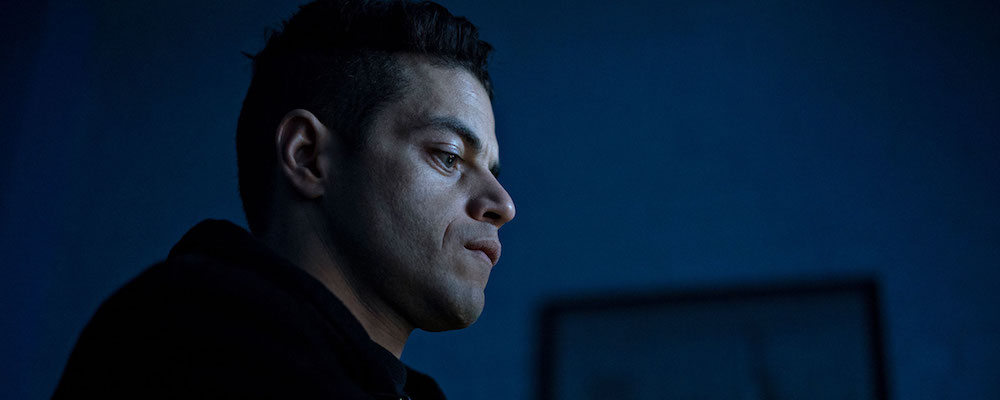‘Mr. Robot’ Series Finale Pulls the Rug Completely From Under the Show’s Entire Premise
Alci Rengifo
When a series comes to an end long-awaited answers tend to be delivered and major character arcs come to a close. “Mr. Robot” has decided to finish a massive arc with one of the year’s most cryptic, puzzling finales. A show that began as an anarchic call to arms via the image of the modern-day hacker bows out as a twisty psychological thriller where reality itself is bent backwards. It certainly wants to exit in grand style, delivering a slow burner epic of 2 hours. Keeping our attention is Rami Malek, who began the show as an unknown four seasons ago and now leaves it as an Oscar-winning star.
Elliot Alderson (Malek) finds himself wandering a strange reality which seems certainly unreal. After the events of the last episode Elliot is lying on the ground where a power plant once stood, now disappeared. The ground begins to tremble and Elliot then appears walking down his old neighborhood in Washington Township. All seems to be back in place, as if the whole Whiterose machine from earlier did succeed in placing Elliot in an alternate, preferable timeline. His father (Christian Slater) is back to running the Mr. Robot repair shop, Elliot’s mom is alive and cheerful, and he seems to be engaged to Angela (Portia Doubleday), who he is marrying in 24 hours. But none of this seems right and Elliot rushes to what should be his apartment, which is instead inhabited by him actually, but as a more clean-cut version. When yet another earthquake takes out “New Elliot,” the one we’ve known continues on a quest which eventually leads to therapist Krista Gordon (Gloria Reuben), who reveals a shocking truth to our hacker hero.
Divided between two episodes, written and directed by creator Sam Esmail, the series finale for “Mr. Robot” makes no effort to recap anything for the nonfan. It’s clear this is a sendoff designed for those who have stuck with the show through all four seasons. Visually it is slick and evocative, although almost entirely devoid of any technology. Computer screens, viruses, even numbers are almost completely cast aside. It has all become a maze within Elliot’s mind. In its original, acclaimed season, “Mr. Robot” made its mark as a thriller for the era of the revolutionary hacker. Elliot was a one-man Anonymous, taking on the powers that be with what he could do with a keyboard. In its final seasons the show then evolved into a total brain teaser, where even Mr. Robot himself, played by Christian Slater, turned out to be a figment of Elliot’s mind, a symptom of his own disassociation syndrome. The finale is a massive puzzle where Elliot seems to be traversing realities, all shaken by a mental earthquake. He walks into an apartment to see Angela’s parents, who are quirky and jovial, and then another Elliot calls the in-laws on an iPhone. What’s going on? Well, there’s another Elliot, the one now living in our hero’s apartment. When another earthquake kills him regular Elliot disposes of the body and tries to make it to his own wedding. Yet once he arrives the guests all have fsociety masks on. None of it is all. It’s all a series of moments and landscapes within Elliot’s slumbering mind.
If there’s a key flaw to this finale is that Esmail seems to be grasping at excuses to expand the last chapter into two one-hour episodes. “Mr. Robot”, particularly from the third season onward, had become another example of “slow burner” TV where shots can feel like an eternity and action is far and between. A few scenes feel unnecessarily thrown in, as when Elliot gets rid of his double and has a whole standoff involving a cop outside of his apartment.
But once the finale goes into its final act it becomes mazes within mazes, almost akin to a movie like Christopher Nolan’s “Inception.” As Kristen Gordon reveals to us, and to Elliot, this whole time even this Elliot we’ve been following season after season is a creation within the real Elliot’s mind to protect him from harm. Quite a proposition but it makes for a haunted performance by Malek, who has defined this character with a quiet tension masking a great intelligence. His best, final delivery of good drama in this show is when Elliot tells his sister Darlene (Carly Chaikin) he is not the brother she thinks she knows, and Darlene confesses she’s always felt apart from him. But there’s more. The hacker Elliot of the entire series, the one who unleashed cyber havoc and promoted anarchist revolt has been a ruse, a psychological mirage. Like Mr. Robot, none of it was real. The final scene involving Malek has him sitting in some kind of mental movie theater watching projected images before another eye opens in a hospital room, filling the frame. It is the real Elliot, with Darlene there to welcome him.
It’s quite a bold proposition by Esmail to reveal that everything fans of “Mr. Robot” followed with devotion was false. The suggestion seems to be that we’ve been following a hallucination all along. A final voiceover by Elliot attempts to justify this approach with a message about finding comfort in being yourself even when you pretend to be someone else. It’s not boring television by any means, simply an odd closure to a show that began with such a clear identity and theme.
Still, “Mr. Robot” was one of the great post-Wikileaks shows, dramatizing the idea that 21st century revolutionaries are the most dangerous when using technology. Elliot was a wonderful creation, a vulnerable hero defined by his brains than brawns. The series ends on a note as cryptic as anything on television this season, yet still compelling even when it chooses serenity over exuberance.
“Mr. Robot” series finale aired Dec. 22 on USA.

